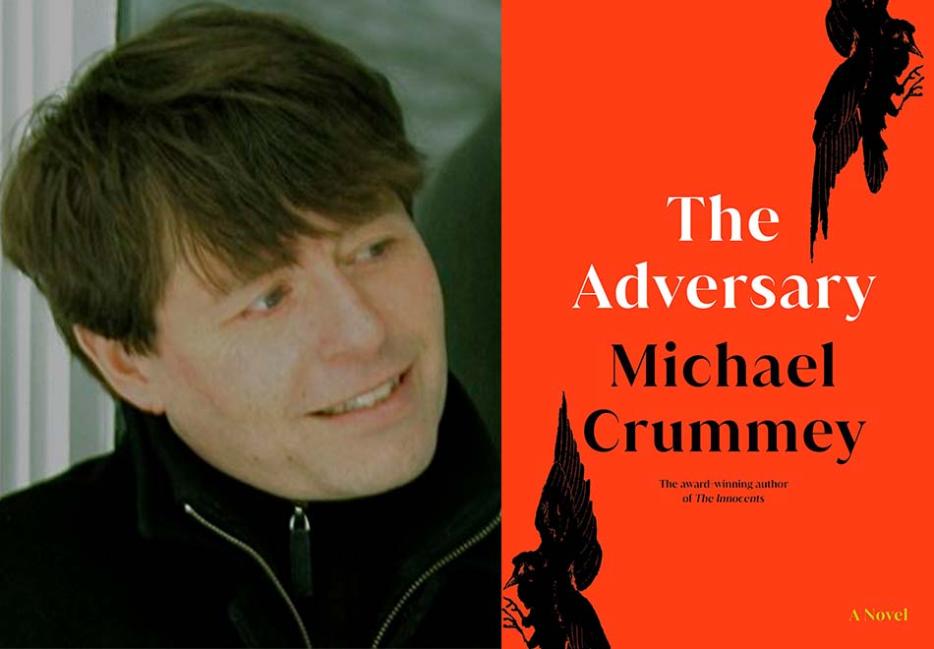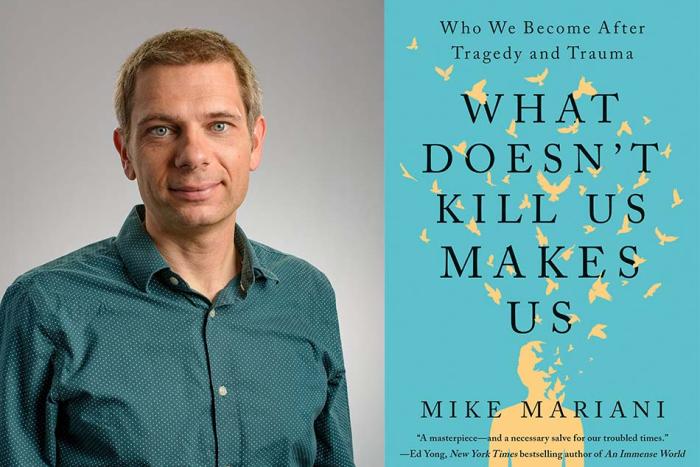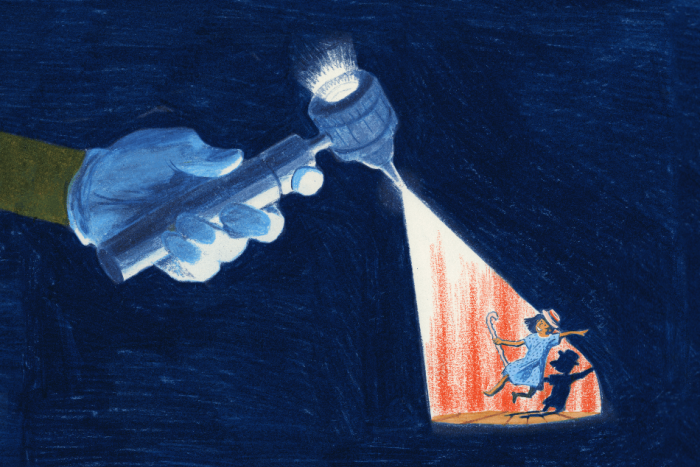I am driving to Michael Crummey’s east end St. John’s home on a muggy Friday morning. I live in the east end now as well so it is a mere scoot up over the hill to his house, securely tucked in the bulb of a green cul-de-sac. It is just before ten and the temperature is well in the high twenties with heat warnings for the afternoon. My daughter’s daycare has already sent an advisory out to parents, they will be forced to close early due to a projected humidex in the high thirties. It is unpleasant and unsafe for toddlers when the noon sun shifts to face the building, so time for adult and/or literary conversation runs short. Michael is in town just for the day; errands, appointments, pick-ups. Many Newfoundlanders, myself included, prefer our breezy bays in the summertime and Michael will head back out to his later in the evening. My envy is palpable though I am unfortunately townie-bound now as my husband’s job requires we summer in the city. I am thinking about what I wouldn’t give to stomp along the landwash in my short sleeves and rubbers when I arrive at Crummey’s door.
Michael is making crackers. Their household is attempting admirably to decrease the amount of plastic in their daily lives and I feel a wave of regret wash over me. The plastic passing through my recycling bin bound for nowhere is of late more than I had ever imagined. Life with a small child seems inundated with well-meaning workarounds encased in clear containers of hope and despair. How many fruit trays have I grazed from in the last two years of sleep-deprived pandemic parenting? More than I anticipated and am willing to admit. I am filled with a lazy shame and internally vow to only consume produce sliced at home from now on. Or as often as possible.
Stella, the family’s elderly dog, wiggles and weaves around my legs in greeting. She’s wearing a cone which does little to dampen her friendly disposition. She’s a good dog. Warm and eager despite her senior years. Michael and I immediately dive into a deep catch-up, we have hardly seen each other since 2019 and the better part of an hour passes before we turn our words and thoughts to his new novel, The Adversary (Knopf Canada). This is the real reason for our visit.
Crummey, as reliable as a well-wound wall-hung clock, publishes approximately every four years. His new novel is the antithesis of his last, the Scotiabank Giller Prize-nominated work The Innocents. In this twisted tale, Crummey has set out to explore the limitations of free will in the face of overwhelming corruption. A Cain and Abel story for our age where the two main protagonists are brutes who fail to undergo the transformative redemption that is so popular in literary fiction. Their irredeemable and destructive nature is central to Crummey’s character exploration following the trajectories of a pair of ruthless merchants competing for control on Newfoundland’s northern coast.
Set in a period beyond reproach and recollection, Crummey’s novel explores the power dynamics woven into the island’s rural, remote, northern outpost where the labour force historically consisted mainly of squatters stranded by unfortunate circumstance. While fictional, the merciless world inhabited by the toilers populating Crummey’s work is very reminiscent of my ancestry. Self-determination and freedom of choice eluded those who found themselves washed upon the peninsula’s shores by poverty and poor luck. My people are the unnamed, the native and the indentured, the characters who are trapped within the orbit of Michael’s hateful dictators, two black holes who think of others only as movable pieces in a numbers game of harrowing struggle. The Widow Caines and Abe Strapp cannot see the humanity in any of the humans sucked into their horrid gravitation. This is by design and purposeful execution. Crummey is deliberately acknowledging the futility in searching for benevolence where none exists and he is right to do so as readers will undoubtedly look for a sliver of shelter even where none can be found.
I confess to having early on felt a brief kinship with the Widow Caines.
I was attempting to identify with a protagonist in a position of power, desperately searching for someone who might resonate with me. I suppose I was seeking a team to root for with the capacity to potentially win, having recognized at the outset that the children in this story were unlikely victors. In order to affiliate myself with prosperity or survival even in the smallest imaginative sense, I was willing to ignore toxic and manipulative tendencies and align myself with the marginalized character I felt most closely resembled my lived experience. The Widow Caines; a woman seeking to exist fully in an unjust patriarchy preventing her from realizing her intellectual ambition. I was looking for something in someone that I wanted to see and thus denying the gravity of their actions and intentions.
How often do we side with the lesser of two evils in an attempt to shield our fragile psyches from emotional threat? How routinely do we overlook or reconcile damaging behaviour out of a desire to self-protect? We are hiding from bullies even within the pages of books. Crummey acknowledges that the widow’s potential for empathy was indicated by readers in earlier drafts and so he chose to decisively resolve any ambiguity regarding her character in a series of scenes that irrefutably declare her true nature. This narrative choice fractured my false allegiance to the widow through finite acts of physical and psychological violence. Readers will recognize the final straws when they are dutifully broken in a fit of rage and frustration.
This pattern of behaviour, on closer examination, is as organic and predictable as the sense of humour and entitlement exhibited by Strapp’s motley crew of hangashores who take advantage of their proxy to privilege. The fact that these tertiary characters behave as expected does nothing to decrease the effectiveness of their presence and purpose. Rather, it acutely reinforces the central premise that Crummey is exploring regarding living conditions and human potential for abuse. Inside of this harsh and unforgiving ecosystem, ordinary men can only believably behave harshly and unforgivingly. Their immorality is not a reflection of their individual failings but a reflection of the infectious petri dish that nurtures their growth. Crummey is examining our original culture through the vile beginnings we often choose to block out, though choosing to be willfully ignorant is a poorly constructed disguise as the body remembers what the mind denies. Their essential unity cannot be evaded to serve an easily digestible and false history. The conditions of living will determine the quality of life for all regardless of fanciful and contradictory tales of comfort.
In the novel, the Lambe children’s future path is duly marked upon by the death of their father and their mother’s subsequent grief. Their childhood is eaten alive and they are forced into adulthood well before maturity. Fairy tales that would have them overcome these circumstances are just that, make-believe childish stories told by adults to rid all of traumatic accountability.
Anne of Green Gables is an anomaly, The Adversary is a statistical truth.
While set in the past, the novel is very much inspired by and reflective of the present ideological narrative prioritizing transactional disposability over intentional sustainability. We are living in trash times where respect for all living things is regarded as an obstacle to growth and progress, words which have long-since been made meaningless by their subverted and subjective definitions. It is a heart-wrenching slog for those of us determined enough to watch the daily news and actually hear what is being said rather than transpose the dialogue into what we need to hear to appease ourselves. The late-stage globalized capitalism that presides over every aspect of our lives dictates the world of all, regardless of our ability to demonstrate power over the increasingly concerning narrative. The individuals in charge of determining our security, even the price of bread, conduct business as if the world were not demonstrating its fragility with each raging fire and flood. Like the characters in Crummey’s new novel, they appear to be unconcerned with the level of suffering their racketeering practices inflict upon the masses. Sociopaths and psychopaths self-select as our unnatural leaders while empathic and intellectually generous candidates are excluded by a political system that favours corporate greed over prosocial actions.
Crummey has gifted himself an opportunity to discuss our flawed democracy by constructing a novel where the facade of due process does not exist. This makes for an interesting investigation of settler colonialism in rural, remote, northern Newfoundland. Many of the characters in Crummey’s novel fail to benefit in any manner as a result of their forced relocation and necessary participation in industry. They are merely a fragile glass by which to reflect the Widow Caines and Abe Strapp’s appetites back to themselves. Their exterior world is an ill-suited and vapid replacement for the healthy and rich interior world both protagonists failed to cultivate in childhood. As a result, these empty people remain empty no matter the amount of resources they consume and so they must continue to seek out wholeness. Their hunger persists as maladaptive coping mechanisms cannot be satisfied.
Crummey’s assertion of powerlessness is most pronounced in his secondary characters who are constantly acted upon by murder, molestation, and neglect. There is no accountability for the casual and recurring abuse the trio of children central to the unfolding plot endure at the hands of the merchant pair and the culture of violation they devise. The manipulative narcissistic individuals who are the purveyors of the children’s hurt are quite literally the judge and the jury of infliction and so there is no avenue for justice available to them. Bride, Solemn, and Lazarus bear collectively every adverse childhood experience documented and as a result they subsequently manifest arresting trauma responses. Their codependence, anxious attachments, and poorly-functioning emotional regulators make them further victims of their life’s trajectory.
The novel is as much an argument for appropriate child care support and resources as any book written directly in pursuit of that goal. A society that does not value women, children, child-rearing, and parental health and wellness breeds remorseless serial killers. I am not referencing specifically the sort of individuals that absorb pop-culture fascination, though it is overwhelmingly applicable to the Dahmers about the place, but to the lauded business leaders of these so-called great nations who in shockingly present tense do little to prevent thousands upon thousands of deaths directly as a result of a climate crisis their extreme wealth has created. These hoarders of influence lord their power to save us by doing nothing to save us. Our value system based on competition and greed has made them such, just as the Widow Caines and Abe Strapp are formed in social and environmental conditions that bring out the very worst aspects of their personalities. The culture creates the consciousness that the reader is privy to throughout Crummey’s 300-plus pages.
One could go further in deducing that our villainous pair also have a pocketful of aces, but Crummey is less concerned with the why and how of it. He has shifted his narrative focus toward the outcome and I understand his urgency in doing so. The time for passivity has grown thin and unappealing in the face of such dire catastrophe and Crummey, one of Canada’s most well-regarded and beloved living artists, has found himself upon the political fray. I ask him if he feels this is the responsibility of artists in the Anthropocene. More directly, I ask if this is his responsibility as a writer.
Michael responds without hesitation that it is his responsibility as a parent.
And like Crummey’s approach to investigation in The Adversary, I am no longer concerned with the minute details of how he has become politicized once again. I am just glad that he is here. I choose to take some comfort in it and hope that his gentle manner and abundant intellect can bring others along to face the great readjustment that awaits us. It is not an aimless hope. There is a genuine glimmer of something tangible because Crummey’s book is the opposite of a black hole. The Adversary’s themes and preoccupations have the narrative potential to cast a light upon the everyday scoundrels seeking re-election on our television screens, across all devices and platforms. Crummey confesses he has been arrested for taking his place upon the protest line in the past and that he is ready to do so again. And I am ready, too. I do not want to leave my daughter a burning world run by greedy zealots and moronic strongmen.
We talk about the book and writing and family as we flood out into Michael’s driveway. Time is up for us today. We hug goodbye and go fetch our children from the midday sun. We may be moving in opposite directions but we are headed toward the same purpose. I intend to do whatever I can to get there. And I will start by cutting up my own watermelon. Styrofoam be damned.






